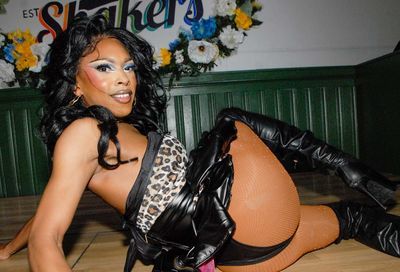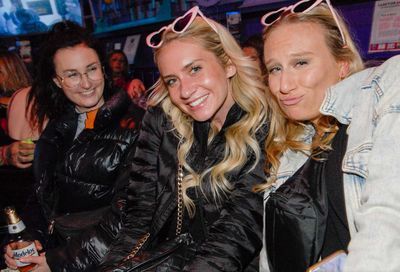World Bank Relents
Following Metro Weekly report, groups' petition effort, bank pulls matching funds for ''ex-gay'' organization
On Nov. 10, Metro Weekly reported that Parents and Friends of Ex-Gays and Gays (PFOX) had been listed as an eligible organization in the World Bank’s 2010-2011 Community Connections Campaign, which would give the ”ex-gay” group matching funds provided by the bank for any employee donations given to PFOX through the drive.
Although a spokesman initially defended the decision, the World Bank eventually relented, telling employees on Nov. 15 of a change in the policy that will keep PFOX – and 25 other organizations – from getting any more matching funds during this year’s campaign.
As part of the World Bank’s efforts to ”strengthen communities,” the Community Outreach Program coordinates an annual workplace-giving campaign that includes World Bank matching funds given to various community groups and international nonprofits. Depending on the level of employee participation, the bank’s matching funds in the past have been either 50 percent or 100 percent of the employee donations.
For the first time, the World Bank’s 2010-2011 Community Connections Campaign included PFOX immediately above Parents, Families and Friends of Lesbians and Gays (PFLAG) on its list of eligible organizations, a fact confirmed by a World Bank spokesperson.
The spokesperson told Metro Weekly in an e-mail on the evening of Nov. 10, ”The Bank is not endorsing this group, or any other group. Staff are free to give to the organization of their choice.”
Wayne Besen, the executive director of Truth Wins Out and who has been writing about the ex-gay organizations for more than a decade, told Metro Weekly on Nov. 10, ”It’s as sickening as it is scandalous.”
The American Psychological Association has studied efforts to help people change their sexual orientation, resulting in a 2009 resolution concluding, ”there is insufficient evidence to support the use of psychological interventions to change sexual orientation.”
The resolution went on to ”encourage mental health professionals to avoid misrepresenting the efficacy of sexual orientation change efforts by promoting or promising change in sexual orientation when providing assistance to individuals distressed by their own or others’ sexual orientation.”
PFOX, however, describes its mission on its website by stating that, ”Each year thousands of men, women and teens with unwanted same-sex attractions make the personal decision to leave homosexuality.”
”However, there are those who refuse to respect that decision,” the site tells visitors. ”Without PFOX, ex-gays would have no voice in a hostile environment.”
Besen, though, said of the World Bank’s inclusion of PFOX in its campaign, ”It’s unbelievable that they’re putting forth a group that is rejected by every mental health organization out there. This is not a charity – or, is only in the most technical terms – this is a group that’s not designed to help people, but to hurt them.”
In addition to PFLAG – which the World Bank spokesperson noted ”has been a Community Connection charity for the past nine years” – other organizations that support the LGBT community and/or those with HIV/AIDS listed as eligible organizations in the 2010-2011 roster include Brother, Help Thyself; Food and Friends; Metro TeenAIDS; Sexual Minority Youth Assistance League (SMYAL); and Whitman-Walker Clinic.
After Metro Weekly‘s Nov. 10 report, however, Truth Wins Out and Change.org started a petition campaign, concluding the petition by having signatories tell the bank, ”I urge The World Bank to cease funding or matching gifts for hateful groups like Parents and Friends of Ex-gays.”
TBD.com’s Amanda Hess followed up on Nov. 15, talking to one World Bank staffer who is LGBT, who said, ”If a charitable association supporting female genital mutilation, a pro-life organization or an association claiming it can turn black people white had wiggled its way in the CCC, the bank’s management would have removed it immediately and issued an apology.”
On the same day, the World Bank did respond – in a way – with an e-mail sent out to people involved in the Community Connections Campaign. The Nov. 15 e-mail, a copy of which was sent to Metro Weekly, detailed that ”Bank Management has made a decision regarding this year’s Campaign and the provision of matching funds.”
The e-mail later stated, ”For this year’s Community Connections Campaign, Bank-matching funds will be provided to those organizations that have, through prior participation, established a track record of support with staff. Organizations that have come on the list this year will not be offered matching funds in this year’s campaign, though the Bank will match any contribution that has been made to this latter group prior to today, November 15, 2010. We will review the new organizations after one year, to see if they have the staff and community support to warrant a match in the FY12 campaign.”
As such, while employees will continue to be able to select PFOX for their contributions this year, the World Bank – because PFOX is new to the list this year – will only provide matching funds for donations to the group made before Nov. 15.
Metro Weekly also learned, however, that there are 25 other organizations that were recognized as eligible for the first time this year. They, per the World Bank e-mail, will also have their World Bank matching funds cut off as of Nov. 15. Among the affected groups are the National Wildlife Federation and local arts groups such as CityDance Ensemble, Dance Place and GALA Hispanic Theatre.
Asked if the decision was made because of the attention focused on PFOX’s inclusion in the campaign, a World Bank spokesperson told Metro Weekly on Nov. 16, ”Bank management took this decision to maximize contributions to charities with an established track record in our Community Connections Campaign during these tough financial times.”
The spokesperson declined to clarify further.
Support Metro Weekly’s Journalism
These are challenging times for news organizations. And yet it’s crucial we stay active and provide vital resources and information to both our local readers and the world. So won’t you please take a moment and consider supporting Metro Weekly with a membership? For as little as $5 a month, you can help ensure Metro Weekly magazine and MetroWeekly.com remain free, viable resources as we provide the best, most diverse, culturally-resonant LGBTQ coverage in both the D.C. region and around the world. Memberships come with exclusive perks and discounts, your own personal digital delivery of each week’s magazine (and an archive), access to our Member's Lounge when it launches this fall, and exclusive members-only items like Metro Weekly Membership Mugs and Tote Bags! Check out all our membership levels here and please join us today!





















